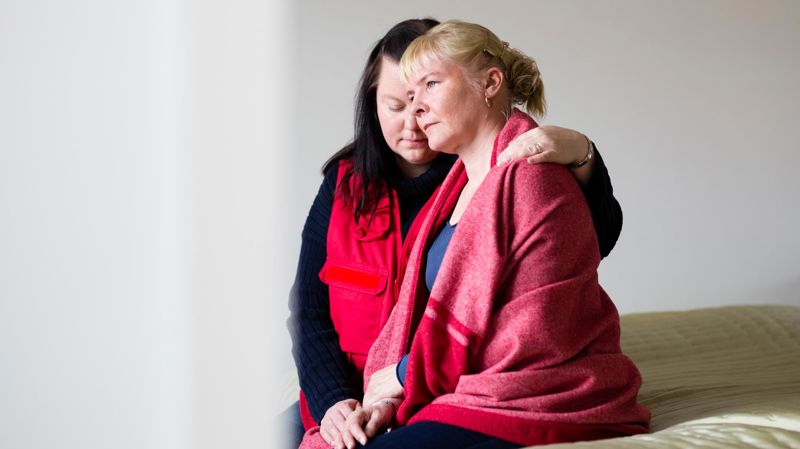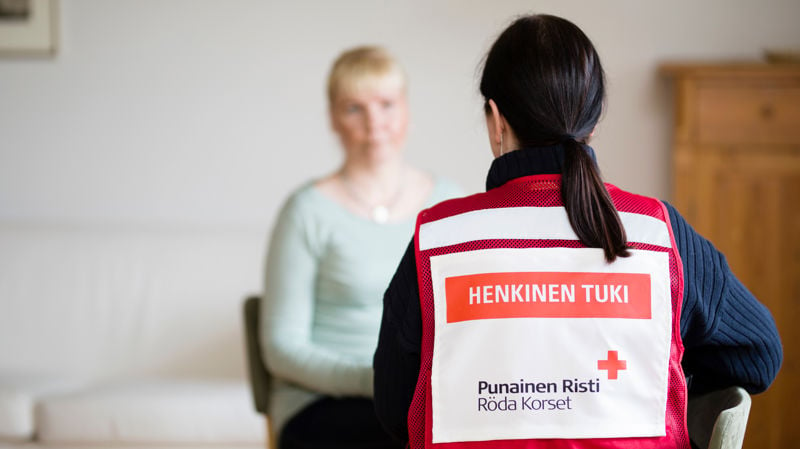Ukraine crisis may feel disturbing

Some may find the current news about Russian military operations in Ukraine upsetting
Anyone following the situation in Ukraine may feel concerned and anxious. The flow of news is bringing military operations, material destruction and perhaps even loss of life in front of our eyes.
Such events may result in powerful reactions, which often follow certain patterns. However, people naturally react differently.
Typical reactions to shocking news
- The events may feel strange, difficult to comprehend or unreal.
- What is happening and news about the events occupy your mind.
- You may be scared that things could spread geographically, for example to Finland.
- Your thoughts and emotions may vary and be quite strong: You may feel fearful and anxious or be tearful. You may also feel annoyed or angry about what is happening. Alternatively, the news may also have a numbing effect.
- Your body may experience a stress reaction: you may have a headache or muscle tension, and feel nauseous or sweaty.
- You may have trouble falling asleep, or your sleep may be interrupted.
When mild, these symptoms are normal and understandable, and if they are short-term in nature will require no immediate professional help.
However, it is beneficial to talk about your feelings and symptoms with a family member, some loved one or a friend. You can also call a helpline.
If the feelings mentioned above persist, become worse or cause significant anxiety, it is a good idea to talk to an expert or a professional.
It should be noted that people’s reactions to the same event differ, and some react more strongly than others.
Ways to help yourself cope
- Talk about your experience with others. Tell them what you think and how you feel about the events. Talking about a negative experience will help you come to terms with it.
- Continue to attend school, go to work and carry out any other daily routines.
- Exercise will do you good, because it relaxes your body and, subsequently, your mind. For example, a walk or some other form of light activity will help.
- Avoid excessive amounts of alcohol and sedatives.
- Listen to what your close friends and family are thinking and feeling regarding the events, and share your experiences.
- Sometimes it is easier to express your feelings through action instead of talk. Draw, paint, write, play an instrument or exercise.
When to seek help from others?
Seek discussion support if:
- You are constantly feeling anxious, depressed or nervous, or suffer from uncontrollable bursts of emotion.
- You are constantly suffering from insomnia or interrupted sleep.
- You are unable to concentrate.
- You are struggling with work or school.
- You have physical symptoms related to stress or anxiety.
- You are constantly feeling overly aroused.
- You have no one to talk to.
- Your relationships are suffering and you are isolating yourself.
- You are constantly and compulsively thinking about world events.
Seek help if you have any of these symptoms.
Special groups
The events may touch the most vulnerable people, such as children, the elderly or individuals who moved to Finland from a war zone. Additionally, people with relatives, friends or other ties to Ukraine or Russia may react strongly to the situation.
Children need support
Children will also react to shocking events and the related news, even though their reactions may sometimes manifest themselves differently to adults.
A child might hear about the events during play, or at daycare or school, even if they were not discussed at home. A child might feel scared that it is ‘the end of the world’, because a friend said so.
Children’s reactions may show through their games or other daily activities. They may also have seemingly unrelated symptoms, despite the original cause being fear over what is happening.
You can support children in the following ways:
- Shield children from the news, and from seeing and hearing the most graphic events.
- Talk about the situation with children and encourage them to use their own words.
- Encourage children to express their feelings by playing or drawing, for example.
- Support children by telling them that the events are taking place far away from Finland and that things here are calm and peaceful.
- Tell them that their lives will continue as normal.
- Enhance their sense of safety by maintaining normal routines.
Supporting the elderly
There are still those in Finland who were children or adolescents during the previous war that our country was involved in. The current tensions in the world and Russia’s involvement may provoke difficult memories and emotions, even fears, in them.
You can support older generations in the following ways:
- Listen to them and help them talk if old memories or experiences surface.
- Offer support and calm them down by telling them that the events are taking place far away from Finland and that it is calm and peaceful here.
- Spend time with them and try to ensure that they are not left alone and that any worries they might have are heard.
Immigrants from conflict zones
There are many people in Finland who moved here from restless areas, even war zones. They might have first-hand experience in challenging life situations, incidents of violence and military operations.
Furthermore, they may have experience in the theme of being a refugee and may identify strongly with the situation in Ukraine. Following graphic news reports may cause old memories and feelings to resurface and make them feel restless in many different ways.
You can support people with prior trauma in the following ways:
- Promote their immediate sense of safety and assure them that life in Finland is currently calm and peaceful.
- Limit their exposure to media content and violent events.
- Offer them an opportunity to talk and share.
- If necessary, children should be provided with special support.
Instructions in Ukrainian (PDF)
Instructions in Russian (PDF)

